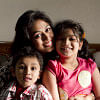To most parents and grandparents of today, children are decidedly less respectful now than they were in the past, largely due to changing family structures and shifting styles of upbringing.
In the last decades, children were inevitably taught to respect authority figures such as parents, teachers, and law enforcement. Terms such as saying "please" and "thank you" and addressing adults formally were introduced early, with no questions asked. Family dinners were prime moments to model and practice correct behaviour, allowing children to learn etiquette in a closed, structured environment.
An important difference nowadays is the modern family structure. Thanks to the relatively low economic pressures of the past, at least one of the two parents was full-time, being able to afford the time to make sure their children understood the importance of respectful behaviour.
Busier schedules of today, paired with higher economic pressures, have families relying more and more on dual incomes, making it harder to reinforce consistent boundaries.
Back in the day, parenting was seen less as a complex identity and more as a straightforward responsibility to raise polite, respectful children. Discipline was doled out strictly and immediately, and there was little emphasis on individual expression.
Today, parents are more aware of their children's emotions, seeking to first understand the root cause of the behaviour, rather than laying out a blanket consequence. While this may outwardly seem like a more relaxed attitude by the parents, it is expected to be better for shaping their personalities in the long run, helping them understand the errors of their ways and rectifying themselves on their own, rather than parroting an apology they do not mean.
Another important shift lies in children's exposure to diverse role models. In the past, family and a few neighbours were chief influences, with television and books playing small roles. Today, children are exposed to the internet and countless other influences. This can create complexities in their value systems and dilute traditional teachings, as children try to balance a variety of perspectives.
Perhaps, a way of looking at it could be that children these days are more acutely self-aware than in the past. Research has shown that teaching children blind respect can often result in them displaying people-pleasing behaviours later in life, as they focus on being "nice" and suppress their inner voices so as not to upset others.
Parents of this generation are keenly aware of such issues, having enough research at hand to back their children when they displease people by prioritising themselves. This can sometimes be seen as a lack of conventional "respect" but it does not have to be.
Experts note that the perceived decline in respect may reflect a generational misunderstanding rather than a lack of respect itself; considering everything, today's youth are simply navigating a different landscape with their own set of skills and social expectations.
If one looks at it positively, respect has not necessarily diminished; it has evolved. As each generation adapts to its unique circumstances, the notion of respect is shaped by the times, rather than simply being straightforward deference to authority.













Comments